Don M. Winn's Blog, page 32
March 21, 2013
Understanding Your Dyslexic Friend/Child/Spouse/Student
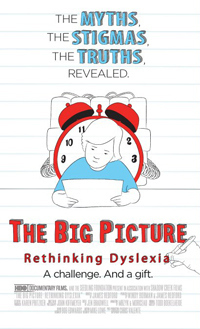 On February 28th I attended a screening of an outstanding documentary called The Big Picture: Rethinking Dyslexia. (poster at right) The Rawson Saunders School in Austin hosted the screening along with the panel discussion that followed. I highly recommend this film to anyone who is dyslexic or anyone with a loved one with dyslexia and to all educators.
On February 28th I attended a screening of an outstanding documentary called The Big Picture: Rethinking Dyslexia. (poster at right) The Rawson Saunders School in Austin hosted the screening along with the panel discussion that followed. I highly recommend this film to anyone who is dyslexic or anyone with a loved one with dyslexia and to all educators.
It is no secret that I have dyslexia. I’ve written about it before in this blog. But after seeing the documentary, I was absolutely flabbergasted. Why? Because for me the effects of dyslexia reach so much farther than just my difficulties with writing, spelling and being a slow reader. Many other aspects of life are difficult for me, and until I saw this film, I never really connected them with being dyslexic.
It is estimated that 1 in 5 children have dyslexia. Most of them are never diagnosed. Many adults also struggle with it without knowing the reason for their difficulties. So I thought I would share some of my recent realizations about myself. Perhaps you may be struggling with similar things, or if you are a parent with a dyslexic child, reading my experiences might help you gain a deeper understanding of what your child may be going through.
Note: The symptoms and severity of dyslexia vary from person to person. Not all dyslexics have the same difficulties, although some symptoms of dyslexia – such as slow reading and difficulty writing – are universal.
Here are a few of my recent realizations:
Students are often encouraged and sometimes required to take notes during a class or lecture. And that’s a great way to remember what the teacher discussed. But for me, there’s just one problem with this scenario: I can’t take notes—not good ones, that is. Why? Because I have to concentrate so hard on writing the notes that I can no longer hear the lecture and in a very short time I’m completely lost. So I generally have to take mental notes and if I do write something down it’s usually very brief, perhaps simply a word or two as a quick reminder.
I’ve also been puzzled about why I can spell a simple word one day but not the next, and why I can’t follow/understand basic written assembly instructions but I can easily assemble just about anything from the illustrations. Dyslexia also explains why, when leaving an unfamiliar place without a clear focal point, I frequently go the wrong direction. These are just a few of the things I deal with that are all related to dyslexia.
The documentary also reminded me that dyslexia never goes away. A dyslexic person just learns to compensate for it, which is why after all these years of daily practice I still read slowly and have to concentrate on what I’m reading to understand it clearly. Otherwise I’m just mouthing the words and not comprehending most of it.
Many that know me find it quite surprising that I’m an author. But to be perfectly honest, no one is more surprised about it than I am. It has been a long road getting to this point and one reason why I am able to write is because I now have tools and strategies that I use to help myself.
I’ll share some of these strategies in the coming weeks.


March 14, 2013
Unexpected Fan Mail
Tonight I’m posting a letter of appreciation for The Knighting of Sir Kaye that I recently received from a young reader. My previous books have all been picture books for younger readers, and although I’ve gotten some nice notes of thanks from parents, this is the first time that the readers themselves have been old enough to write to me (possibly with a little help), and it’s such a heart-warming experience.
Of course I’m thrilled that this particular reader enjoyed my story. But I am also really impressed to see what aspect of the story this reader enjoyed. It inspires me to keep on writing when I see that a young reader might notice even a relatively small detail in the story and single it out as being something meaningful to him or her. It reminds me that kids see so much more than we might realize at any given moment – whether they’re watching their parents or listening at school or even reading a book. So I just wanted to share this letter. It made me happy. Have a good night, everyone.


March 7, 2013
Why I Don’t Mind Seeing Kids Daydream
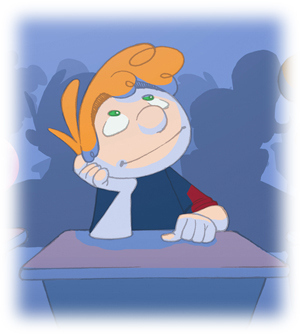 I came across an interesting article a while ago called “Why Daydreaming Isn’t a Waste of Time.” The title especially caught my eye because (1) as a child I was very prone to daydreaming, and (2) one of my books, The Incredible Martin O’Shea, is a book about a daydreamer who learns to pay attention in school. The idea behind the book is that learning in school can help Martin make his daydreams about what he wants to be when he grows up come true. The thing I like best about this story is that it doesn’t condemn the idea of daydreaming, but it can be used by parents to point out to their children that there’s a time and a place for daydreaming.
I came across an interesting article a while ago called “Why Daydreaming Isn’t a Waste of Time.” The title especially caught my eye because (1) as a child I was very prone to daydreaming, and (2) one of my books, The Incredible Martin O’Shea, is a book about a daydreamer who learns to pay attention in school. The idea behind the book is that learning in school can help Martin make his daydreams about what he wants to be when he grows up come true. The thing I like best about this story is that it doesn’t condemn the idea of daydreaming, but it can be used by parents to point out to their children that there’s a time and a place for daydreaming.
Here’s a quick summary of the article.
Unexpected benefits of daydreaming
Daydreaming is a time of looking inward that lets us process the things that take place outside of ourselves. It helps us develop “a rich internal environment” and make sense of what we experience on a day-to-day basis.
Based on a 2004 Stamford University neuro-imaging study, it turns out that giving our minds time and freedom to wander can actually increase our ability to focus and pay attention when needed.
A Suggestion for Parents
Kids are connected to external stimulation (phones, television, music, etc.) more than ever before. Help your kids by setting aside time for them to be unplugged from various devices. Promote quiet time.
I would add one more suggestion of my own for parents.
Set a good example for your kids by taking some time to be device-free yourself. Don’t deny yourself a little time to daydream (although you may have to do it when the kids aren’t around). It will do you good and help you be more focused on all the many things you have to do every day.
So no, I don’t mind seeing kids daydreaming, if it doesn’t drastically interfere with other important activities. I like to know that daydreamers are developing from the inside out, and that daydreaming is going to help them be more focused when needed. Most of all I like to say that it’s okay to be a daydreamer!
p.s. Daydreamer extraordinaire, Martin O’Shea has just been featured in a dreamy book trailer. Check out the YouTube video.


February 28, 2013
Ask Don Contest: Part Three (Last Part)
Here are the three prize-winning questions I chose from the top ten submissions of interview questions by students at Harmony School of Science. The students who submitted these questions recieved a poster and book of their choice as a prize. Note again: The students pictured below are not the contest winners, although they are all winnners in my opinion!
Do you use events from your life in your books?
All of my stories are shaped in some way by the events in my life. The Higgledy-Piggledy Pigeon, a book about living with learning difficulties, was inspired by my struggle with dyslexia as a child. Superhero, a picture book about being a real hero, was inspired by my dad, who always came to my rescue—even after a bad dream. Shelby the Cat, a picture book about bullying, was inspired by the bullying and peer pressure that happened to me as a child. Basically, every author’s writing is shaped by life experiences.
Do you use a mental movie or a timeline when you write your stories?
This is an excellent question. I had to spend a little time thinking about it. All of my stories start out as a timeline, where I lay out the basic storyline. Then as I work on writing the book, I switch to using a mental movie. As the scenes and dialog play out in my mind, I write them down as though I were an outside observer. Using the mental movie method of writing sometimes shows me where to change the story, often because the characters take on a life of their own. One very simple example is when I had planned early on in the timeline of The Knighting of Sir Kaye that Charles Atwood—a village boy—would name an injured wolf Ollie. (That was the name of my dog when I was little, and I really wanted to put it in the story. Ollie was a good dog.) But when I started writing the scene where Charles named the wolf, I realized that Charles would NEVER name a wolf Ollie. So I had to find a different name, one that I knew Charles would like.
I want to be an author when I grow up but I want to know how it is like in the book business. What do you usually do, and can you share any helpful information?
The book business today is very competitive and it can be very difficult to earn a living as an author. You may need to have another job in addition to being a writer, so keep that in mind when you’re deciding what to do with your life. Working at a different job along with being a writer is not a bad idea at all. It can give you great inspiration for things to write about.
If you really want to be an author, then by all means follow your passion. Enjoy the process, write for fun, keep working on improving your writing and storytelling skills and one day you may have a best-seller or an award-winning article. But even if your writing doesn’t rise to that level, it can still be fun and rewarding. I currently support my writing by doing other kinds of work but over time, as I get better established, then I plan on just working on writing.
Most importantly, if you want to be a writer, then WRITE. Your whole life long, make time for writing, every week or every day, no matter how busy you are with other things.
I had a great visit with the students at the Harmony School of Science – one of my very favorite schools to visit. Many thanks to the students, librarian, teachers, principal and staff at Harmony School for always making my visits so enjoyable. I look forward to working with you all again!


February 21, 2013
Ask Don Contest: Part Two
Here are some more interview questions from students at Harmony School of Science along with my replies. Note: the photos in this blog entry are not photos of the students who submitted the interview questions. They are photos of the students who were sitting in the front row of the audience. My apologies to the students in the back rows!
What is your favorite genre and style of writing?
I love adventure stories, but they need to have a good, satisfying ending. For instance, a couple of classic adventure stories that I really like are The Three Musketeers and The Count of Monte Cristo, both of which have very good endings.
One of my least favorite stories is Old Yeller—I hated the ending.
How old were you when you decided you wanted to write books?
I had brief moments as a child where I thought that it would be fun to be an author, but it wasn’t until I was in my 30s that I realized that not only am I capable of writing well, but that it can be a lot of fun too. It was then that I started writing poetry and children’s stories. Not surprisingly, Chipper the Clown, a picture book about following your dreams, was the first of my stories.
What job did you do before writing books, and is there a connection between your job and writing?
I’m still doing the job that I did before writing books—at least for a while longer. I started working as a computer programmer and systems analyst in my late teens and I have been working with computers ever since. I currently manage a group of software developers for the State of Texas. There really isn’t a direct connection between my job and writing books, although being able to communicate well, verbally and in writing, is a very important part of my job.
If you could go back and change any of your published stories, what would you change?
That is a good question but I can’t really think of anything I would change with my stories. I like them as they are now. There may be some additional editing that I may want to do in the future with the Sir Kaye book, but right now I’m happy with what is there. When you write a book, you always see things that you might like to change, but sometimes you just have to stop and tell yourself that you’re done for now.
Next week I’ll post the top three prize-winning questions.


February 14, 2013
Ask Don Contest: Part One
The picture above is a picture of the students (and poster-winners) of the first-ever Ask Don interview question contest. Here are three of the winning interview questions that students at Harmony School of Science submitted to me, along with my answers.
What do you like to do when you’re not writing a book?
In addition to writing, I’m also still working a full time job, which keeps me very busy. Between the job and writing, it doesn’t leave much time for anything else, but on those rare occasions when I do have some free time, I enjoy nature and spending time in the great outdoors. I love science of all kinds. I like to build models—airplanes and sailing ships. I enjoy watching a good movie, and sometime I like just reclining in my easy chair while I give my cat an extra-good massage.
Your kid’s books are great, but we will soon outgrow them. Would you consider writing a book for teens or pre-teens?
It just so happens that today’s Harmony School presentation features the first book in a series specifically for pre-teens—Sir Kaye, the Boy Knight. I am planning on writing 5 more books in the Sir Kaye series. I also hope to publish other stories in the future for older readers. For instance, I’m toying with the idea of some books for teens loosely based on the lives of some great inventors and innovators. However, this is where I need your support. In order for Cardboard Box Adventures to continue growing and publishing books, I need for all of you to spread the word. If you like my books, tell others about it, encourage your friends to read them, submit a review online. Your enthusiasm and support for CBA will ensure that it will be around for a long time.
What was your passion when you were little, and what or who inspired you to write books?
This is good question, and I had to spend some time thinking about it. While I was doing that, I actually made a discovery about myself. As a child, science and art were definitely my favorite subjects, but I do remember times when I thought it would be fun to be an author and to write stories. My dad loved to read, so I always felt that books were truly important. However, because I struggled with dyslexia as kid, reading and writing were very difficult for me. I mistakenly thought that I could never write stories, let alone to be good at it. It wasn’t until I became an adult that I realized that if I really want to do something, even something difficult, that I could learn to do it and even to be good at it.
Side note: Chipper and the Unicycle is all about perseverance and how all of us can learn to do whatever we put our mind to, no matter how difficult it may seem at first.
Check back next week for Ask Don: Part Two.
Below are a few pictures of the kids during the presentation on Medieval Life.


February 6, 2013
Interview with a Student
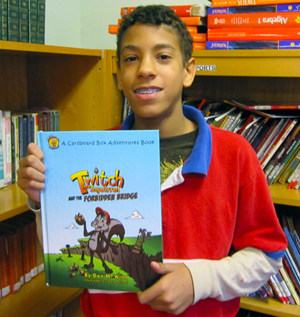 Meet Joshua, a seventh-grade student at Harmony School of Science. Get his take on why parents should read with their kids, and why kids can benefit from stories – especially stories read to them by their parents and teachers.
Meet Joshua, a seventh-grade student at Harmony School of Science. Get his take on why parents should read with their kids, and why kids can benefit from stories – especially stories read to them by their parents and teachers.
Joshua has been helping in the library for the past few weeks by reading aloud to the kindergarten classes. He has especially enjoyed using Don Winn’s picture books and was kind enough to spare the time for a quick interview during a busy school day.
Do you like reading to the kindergarteners?
What’s your favorite thing about it?
Yes. I like to see when they smile.
Do they have any favorite books?
They really like the one about the squirrel. (Twitch the Squirrel and the Forbidden Bridge) Their favorite part is when he starts falling. They really like the picture on that page too.
When you read to the students, do you use the questions at the end of the books? Is there a question that the kids give good answers to?
Yes. I think they help the kindergarteners talk about the books. They like the question about why the squirrel wanted to go across the bridge. They have lots of things to say about that, and they give all kinds of answers to the different questions.
What do you like about the book when you read it to the kids?
I like that it teaches a lesson about how it’s important to listen to your parents. The kids like that lesson too. They understand it really well.
Do you think stories with lessons are a good way for kids to learn?
Yes. My dad likes to read to us. He uses Aesop’s fables to teach us good lessons. Then he’ll ask us questions, and if we get the answer right, sometimes he’ll give us a prize.
Do you like it when your dad spends time reading with you?
Yes. He’s a truck driver, so he’s not always able to do it, but I like it when he does. It’s nice to spend the extra time with him.
Do you think those times you got to read together will be something that you’ll remember when you’re grown up?
Yes…not every minute of it, but I’ll remember that we used to spend time reading together.
What’s your favorite one of Aesop’s fables? Why do you like it?
The Tortoise and the Hare. Because it’s about not rushing through something, but concentrating and doing something right.
Is that a lesson that you have been able to use in your own life?
Yes. Like with schoolwork. If I just rush through it and try to do it fast, I fail…or I have to do it over again. It’s better just to take my time and do it right the first time.
So if you ever have kids of your own, or maybe if you become a teacher or someone else who works with kids when you’re grown up, do you think that you would teach them by using stories with lessons and asking questions about them?
Yes. It’s a good way to learn. It helps you remember things.


January 31, 2013
A Harmonious Visit
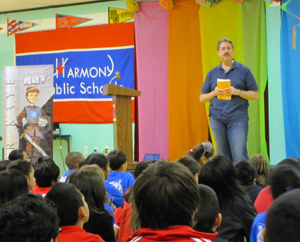 Last week I visited the Harmony School of Science to give a reading and presentation about The Knighting of Sir Kaye and about life during the Middle Ages. I always enjoy visiting the Harmony School of Science—they’ve been so supportive and helpful from the very beginning when I first started visiting schools. This visit was no exception. And yes, the funny-looking guy with a moustache in the picture to the right is me.
Last week I visited the Harmony School of Science to give a reading and presentation about The Knighting of Sir Kaye and about life during the Middle Ages. I always enjoy visiting the Harmony School of Science—they’ve been so supportive and helpful from the very beginning when I first started visiting schools. This visit was no exception. And yes, the funny-looking guy with a moustache in the picture to the right is me.
I only put that in here because I like the colorful background. Why was it so colorful?
Well, the cafeteria was looking particularly festive the day of my visit because the students and teachers had decorated it for their Luau Dance that evening. It looked really cool with all the silhouetted dancers on the walls with a nice beach scene behind them. Here’s a picture:

With the help of the school librarian, some of the teachers, and the principal, we held the first ever Ask Don contest, where students could each submit one interview question for me during the week before my visit. Then the teachers chose the top ten questions and sent them on to me. From this list, I chose the three questions I liked best as the prize-winning questions.
During my visit, after I did my historical presentation and read a short selection from my book, it was time for Q&A. Each student who submitted one of the top ten questions got to ask his or her question in person. All of them received a poster, and the top three questioners were each able to choose one of my books as part of their prize.
It was a lot of fun, and the students came up with some really good questions. I actually learned a little bit about myself by thinking about their questions. And I was impressed by that. I’ve been around for a while, and so I thought I knew myself pretty well. Guess I was wrong. Check back here in the coming weeks to see the top ten interview questions from Harmony School of Science students and my replies. Also, since it’s not fair for me to be the only one answering questions, I’ll be posting an interview with a student as well.


January 11, 2013
Inspirational Role Models for Children with Dyslexia
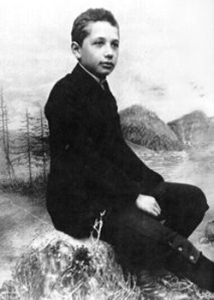
Albert Einstein at fourteen.
What did Albert Einstein, Winston Churchill, Thomas Edison, John Lennon, and F. Scott Fitzgerald have in common? They all had a learning difficulty. They were either dyslexic or had to deal with different traits associated with dyslexia.
One common misperception about people who have a learning difficulty is that they are less intelligent than other people. In fact, people with learning disabilities can be academically gifted and highly motivated achievers. Two in particular – Thomas Edison and Albert Einstein – have always stood out to me.
I know there is some debate about whether these two actually were dyslexic, but the reason I include them here is that as a young man, I found their examples encouraging and they inspired me to keep on working hard and putting my all into everything I did. So here are two extremely short histories of these two men.
About Albert Einstein:
He was a daydreamer. His teachers in Germany told him he would never amount to anything, that his questions destroyed class discipline, that he would be better off out of school. Yet Albert Einstein went on to become one of the most famous scientists in world history.
About Thomas Edison:
When Thomas Edison was 7 years old (in 1853), his teacher considered him “an 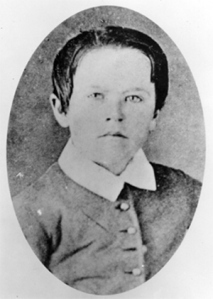 hyperactive stupid” because he was too curious, asked too many questions and was a slow learner. He was terrible at mathematics, unable to focus, and had difficulty with words and speech. His mother finally decided to school him at home where he could learn in his own way and at his own pace.
hyperactive stupid” because he was too curious, asked too many questions and was a slow learner. He was terrible at mathematics, unable to focus, and had difficulty with words and speech. His mother finally decided to school him at home where he could learn in his own way and at his own pace.
By the age of 31 he had invented the phonograph and from that point on he founded 14 companies, registered 1,093 patents, and had employed over 35,000 people in an industrial empire that brought affordable, centrally generated electricity to the world.
Two great Edison Quotes: I have always liked these because they show his perseverance and willingness to try many different approaches to a matter:
“I have not failed. I’ve just found 10,000 ways that won’t work.”
“Genius is one percent inspiration and 99 percent perspiration.”
Why Edison and Einstein?
Now of course I’m no Edison or Einstein, but you might wonder why it was so necessary for me find role models like these who were not afraid to learn and do things differently than other people.
Well, by the time I was 15 years old, I was already programming computers (before PCs). I remember one time an older friend told me that he never thought I would ever be able do anything but simple manual labor and that he was dumbfounded by what I was doing. This was an attitude that I frequently encountered as I grew up.
Such negative stereotypes are not only demoralizing to a child, but they belie the very reality of many kids with learning difficulties. They have the intelligence and in many cases, the necessary motivation to succeed in anything they choose to pursue. In my case, such negative comments only made me more determined to “show them,” mostly because I was very stubborn. But it also made it more difficult for me because I had to figure things out for myself, without any encouragement. Although this didn’t prevent me from progressing, it did delay my progress significantly. Not only did I have a learning difficulty to contend with, but I also had to swim upstream against a lot negative feedback. Belief in oneself is about 90% of the battle.
So I would say to children with dyslexia, don’t give up. Believe in yourself. You can do whatever you are willing to work hard at. And that is true for everyone.


January 4, 2013
Encouragment for Children with Dyslexia. Also Time Travel.
A few months ago I was reading a post by fellow blogger, Fiona, and it caught my attention. Fiona’s post is a letter to children with dyslexia explaining a little bit about what it means to cope with having dyslexia and sharing some of her personal experiences. I thought it was a very kind letter and it touched my heart.
It also got me to thinking.
I too am dyslexic, as I have mentioned before in this blog, and I had a very hard time in school as a child. Not much was known about dyslexia back then, and for me, encouraging words were few and far between.
So I started thinking about time travel. What if I could travel back in time and offer some encouraging words to myself as a child? What would I say to myself? I thought I’d share my musings in case anyone else finds them helpful as well.
Things I would tell my child self: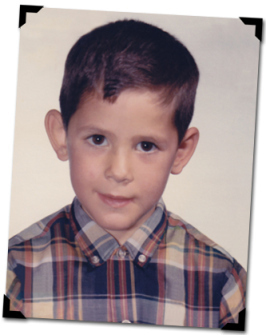
Just because something may be difficult for you, doesn’t mean that you’re stupid or that you can’t do it.
You can accomplish practically anything that you want to accomplish, no matter how hard it may be at first.
Never give up
Be patient with yourself.
There is more than one way to learn something. Just because other kids do things a certain way doesn’t mean that you have to.
Figure out what way works best for you. It’s okay to learn something in a different way and don’t let anyone to tell you otherwise. There is no wrong way to learn something.
You deserve more credit, rather than less, because you are showing up every day to work extra hard in spite of difficulties with learning.
If you put forth the effort, you will accomplish things in your life that you wouldn’t think possible.
Tell yourself these things over and over again:
I am not stupid.
I can do it.
I will be patient with myself.
As hard as it might be for you to even imagine now, someday you will love reading and writing. You will even write books of your own.
Don’t worry. You’ll get used to the moustache.
Next week I’ll talk a little bit more about dyslexia and some ideas that really helped and inspired me as I got a little older and more used to living with it.















